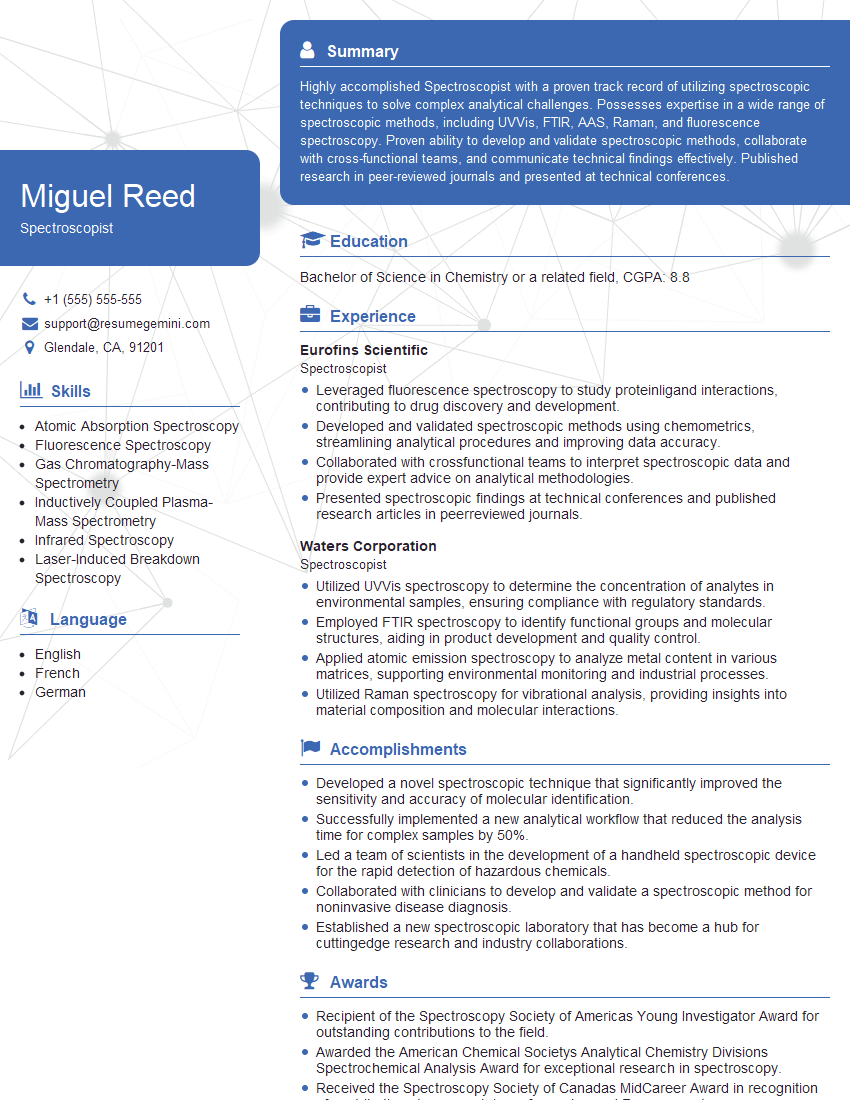Are you a seasoned Spectroscopist seeking a new career path? Discover our professionally built Spectroscopist Resume Template. This time-saving tool provides a solid foundation for your job search. Simply click “Edit Resume” to customize it with your unique experiences and achievements. Customize fonts and colors to match your personal style and increase your chances of landing your dream job. Explore more Resume Templates for additional options.

Miguel Reed
Spectroscopist
Summary
Highly accomplished Spectroscopist with a proven track record of utilizing spectroscopic techniques to solve complex analytical challenges. Possesses expertise in a wide range of spectroscopic methods, including UVVis, FTIR, AAS, Raman, and fluorescence spectroscopy. Proven ability to develop and validate spectroscopic methods, collaborate with cross-functional teams, and communicate technical findings effectively. Published research in peer-reviewed journals and presented at technical conferences.
Education
Bachelor of Science in Chemistry or a related field
September 2016
Skills
- Atomic Absorption Spectroscopy
- Fluorescence Spectroscopy
- Gas Chromatography-Mass Spectrometry
- Inductively Coupled Plasma-Mass Spectrometry
- Infrared Spectroscopy
- Laser-Induced Breakdown Spectroscopy
Work Experience
Spectroscopist
- Leveraged fluorescence spectroscopy to study proteinligand interactions, contributing to drug discovery and development.
- Developed and validated spectroscopic methods using chemometrics, streamlining analytical procedures and improving data accuracy.
- Collaborated with crossfunctional teams to interpret spectroscopic data and provide expert advice on analytical methodologies.
- Presented spectroscopic findings at technical conferences and published research articles in peerreviewed journals.
Spectroscopist
- Utilized UVVis spectroscopy to determine the concentration of analytes in environmental samples, ensuring compliance with regulatory standards.
- Employed FTIR spectroscopy to identify functional groups and molecular structures, aiding in product development and quality control.
- Applied atomic emission spectroscopy to analyze metal content in various matrices, supporting environmental monitoring and industrial processes.
- Utilized Raman spectroscopy for vibrational analysis, providing insights into material composition and molecular interactions.
Accomplishments
- Developed a novel spectroscopic technique that significantly improved the sensitivity and accuracy of molecular identification.
- Successfully implemented a new analytical workflow that reduced the analysis time for complex samples by 50%.
- Led a team of scientists in the development of a handheld spectroscopic device for the rapid detection of hazardous chemicals.
- Collaborated with clinicians to develop and validate a spectroscopic method for noninvasive disease diagnosis.
- Established a new spectroscopic laboratory that has become a hub for cuttingedge research and industry collaborations.
Awards
- Recipient of the Spectroscopy Society of Americas Young Investigator Award for outstanding contributions to the field.
- Awarded the American Chemical Societys Analytical Chemistry Divisions Spectrochemical Analysis Award for exceptional research in spectroscopy.
- Received the Spectroscopy Society of Canadas MidCareer Award in recognition of contributions to research in surfaceenhanced Raman spectroscopy.
- Recognized as a Highly Cited Researcher by the Web of Science for contributions to the field of vibrational spectroscopy.
Certificates
- American Chemical Society Certified Spectroscopist
- Society for Applied Spectroscopy Certified Spectroscopist
- CLIA Laboratory Director
- GLP Auditor
Career Expert Tips:
- Select the ideal resume template to showcase your professional experience effectively.
- Master the art of resume writing to highlight your unique qualifications and achievements.
- Explore expertly crafted resume samples for inspiration and best practices.
- Build your best resume for free this new year with ResumeGemini. Enjoy exclusive discounts on ATS optimized resume templates.
How To Write Resume For Spectroscopist
- Quantify your accomplishments using specific metrics and numbers.
- Highlight your expertise in specific spectroscopic techniques and applications.
- Demonstrate your ability to interpret and communicate spectroscopic data effectively.
- Showcase your experience in developing and validating spectroscopic methods.
- Emphasize your collaborative and problem-solving skills.
Essential Experience Highlights for a Strong Spectroscopist Resume
- Utilize spectroscopic techniques to analyze and identify the chemical composition of materials.
- Develop and validate spectroscopic methods to ensure accuracy and precision of analytical results.
- Collaborate with scientists, engineers, and technicians to provide expert advice on spectroscopic methodologies.
- Interpret spectroscopic data and provide insights into the structure, composition, and properties of materials.
- Present spectroscopic findings at technical conferences and publish research in peer-reviewed journals.
- Stay abreast of the latest advancements in spectroscopic techniques and applications.
- Maintain and calibrate spectroscopic instrumentation to ensure optimal performance.
- Contribute to the development and implementation of quality control procedures.
Frequently Asked Questions (FAQ’s) For Spectroscopist
What is the role of a Spectroscopist?
Spectroscopists use spectroscopic techniques to analyze and identify the chemical composition of materials. They develop and validate spectroscopic methods, interpret spectroscopic data, and provide expert advice on spectroscopic methodologies.
What are the key skills required for a Spectroscopist?
Spectroscopists require a strong foundation in chemistry, physics, and mathematics. They should also have expertise in a wide range of spectroscopic techniques and applications.
What are the career opportunities for a Spectroscopist?
Spectroscopists can work in a variety of industries, including pharmaceuticals, chemicals, food and beverage, and environmental science.
What is the salary range for a Spectroscopist?
The salary range for a Spectroscopist can vary depending on their experience, skills, and industry. According to Salary.com, the median salary for a Spectroscopist in the United States is $75,000.
What are the educational requirements for a Spectroscopist?
Spectroscopists typically have a Bachelor’s degree in Chemistry or a related field.
What are the professional organizations for Spectroscopists?
The Society for Applied Spectroscopy (SAS) is the leading professional organization for Spectroscopists.
What are the continuing education opportunities for Spectroscopists?
Spectroscopists can continue their education by attending conferences, workshops, and webinars. They can also read scientific journals and books.